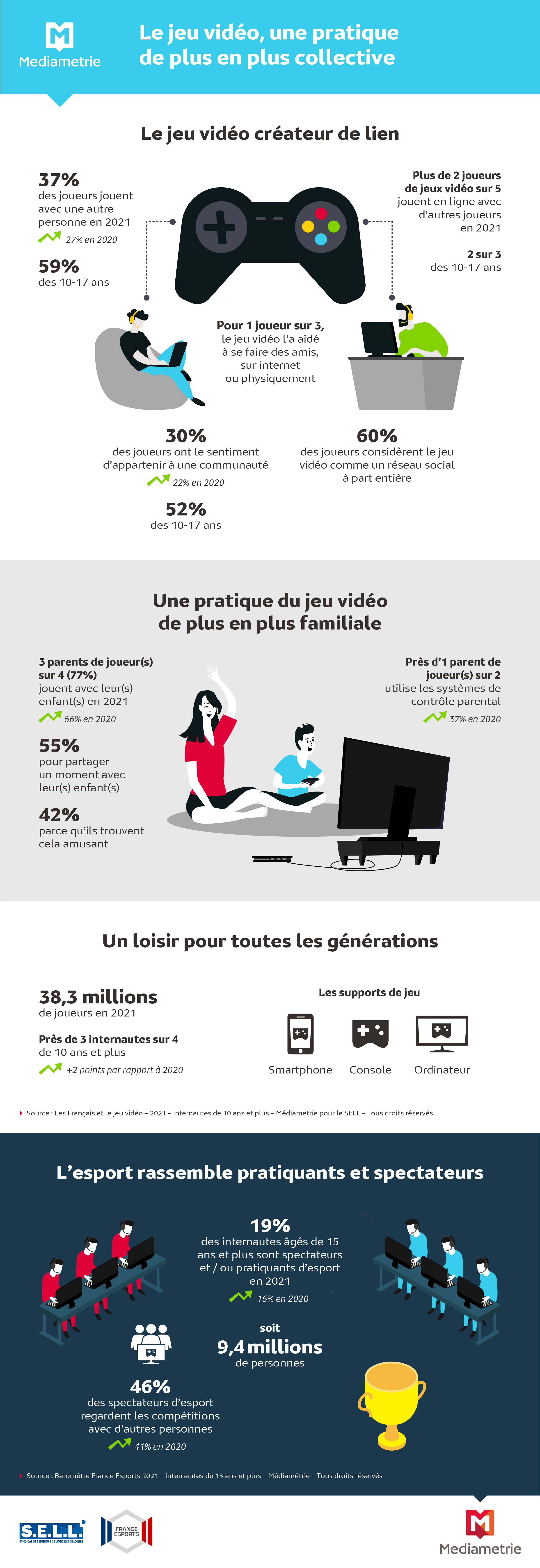- Home
- Results & Studies
- Video gaming: an increasingly collective activity
Video gaming: an increasingly collective activity

Estimated reading time: 5 min 55 s
The number of video gamers who play alongside others in person or online is actively growing. Players enjoy the collective, even social aspect of gaming, as it helps them to connect with others around common interests. Sharing is also a family affair, with parents taking a greater interest in their children's hobby. Esports events add a social dimension to gaming.
Video gaming brings people together
Video games are a growing way to create social ties. Over the past year, an increasing proportion of video game players have been teaming up with others to enjoy their hobby. In fact, 37% of players stated that they usually played with another person, up from 27% in 2020. The figure for children was 59%.
Company is usually in the form of another player present in the living room thanks to the home console. At the same time, online gaming with other players has also developed. In 2021, more than two-fifths of video game players reported that they had played online with others. This practice was more pronounced among those aged under 18 years old, as two-thirds of that age group had played online with others.
Just like any other activity or hobby, video games are a way of making new friends. One in three players felt that video games had helped them to make friends, as much through sharing their hobby online as through gaming together in person.
“Video games foster a strong sense of togetherness and genuine virtual communities are created based on particular games. Gaming offers a new way to socialise and meet new people based on shared interests," explained Xavier Lemuet, Médiamétrie's Director of Ad Hoc & Major Surveys.
A remarkable phenomenon surrounding video games is the growing sense of community: 30% of players felt it, up from 22% in 2020. That sense of belonging was felt even more strongly among 10 to 17 year olds (52%). They described this community as kind and welcoming; for them it was about more than just video games because it brought members together around other topics or common interests.
As a result, 60% of players even thought of video gaming as a social network in its own right because it allowed them to interact with other people online, including outside of play.

Video gaming: more and more a family affair
Due to the various lockdowns, children's immediate family and friends – in particular their parents – have progressively become more involved when their kids are playing video games. In 2021, this was true for more than 3 out of 4 parents of gamers (77%), up from 66% in 2020.
The primary motivation for these parents was to spend some time with their child (55%) – sometimes at the latter's request – and also because it was fun (42%).
This involvement has also initiated greater use of parental control functions, which were hitherto generally known about but seldom used. Going forwards, almost one-half (48%) of parents of gamers will use these controls to supervise their kid's gaming (compared to 37% in 2020).
A cross-generational hobby
Boosted by periods of lockdown, the number of video gamers continues to grow. In 2021, there were 38.3 million gamers, or almost three-quarters of internet users (73%) aged 10 years and over. That figure was up two points on the previous year. Video gaming was popular with children as well as with adults.
According to Xavier Lemuet: "Video games have acquired mass entertainment status, winning over the population at every level, especially thanks to smartphones. The gender gap has also disappeared."
Play frequency increased during the lockdowns and the trend continued during 2021. Nearly three-fifths of internet users played on a daily basis. This trend was particularly pronounced among children, a growing proportion of whom were gaming every day.
Players used a wide variety of devices. Smartphones continued to be a popular device for playing video games, alongside the boom in gaming-specific smartphones. However, use of TV games consoles was up four points, driven by several new models arriving onto the market. Conversely, computers seemed to have fallen out of favour, overtaken this year by the console.
Esports – a growing phenomenon
A more recent video game contest – known as esports – is booming. In 2021, nearly one-fifth of internet users (19%) aged 15 years and over (9.4 million people) had watched or participated in esports. That was up from 16% in 2020.
Spectators of esports formed the majority (7.8 million) as they watched video game contests either at the event, on television or online. Players were either esports hobbyists (5.6% of internet users) who played at different levels, or esports amateur players (3.2% of internet users), who competed in contests organised online and at face-to-face events.
Esports are collaborative by definition since they are competitions. Frequently, audiences bring someone else along, and 46% of spectators of an esport competition did attend with other people, up five points in 2020.
Three questions for Nicolas Vignolles, Managing Director of SELL, the Syndicat des Éditeurs de Logiciels de Loisirs (Union of Publishers of Leisure Software)
How are video games helping to build social skills?
This has been the biggest lesson from the past two years. In 2020, it was clear that video gaming had emerged as a true antidote to isolation during the lockdowns. This social dimension of video gaming continued to grow through 2021. Given that more than 6 out of 10 French people reported that video games helped form social ties (+9 pts on the previous year), and since 77% of parents played video games with their children (+11 pts on the previous year), it is clear just how far video gaming has evolved as an interactive digital hobby, both on screen and increasingly in the company of other people! We predict that this underlying trend will likely intensify due to the fact that the social aspect is felt most strongly by young gamers, turning video games into a genuine media. 53% of children felt a sense of community through video games. Recent technological advances, such as the metaverse, take account of this demand and will no doubt amplify it.
Do you think in the future, gamers will increasingly meet up in person to play together?
Although it is difficult to foresee how gaming will evolve under such an uncertain public health situation, the digitalisation of practices is still very much in progress, and this year, we have noted the growing popularity of multiple players gaming together in person. Indeed, 21% of gamers said that they met up to play together, an increase of seven points compared to 2020. In addition, given that we increasingly hear gaming described as "an opportunity to meet up with friends" or "to share family time", it's clear that video games will continue to be an opportunity for social interaction in the real world. Among the 70% of parents who reported supervising their children's game play, a large proportion also played video games with their children. Clearly, this is the safest way to supervise their gaming activity. In a different field, the boom in competitive video gaming, or esports, together with its increasing media presence could be influencing the desire to play as a team and to gather in one place.
How do you interpret the increasing involvement of parents in their children's video gaming?
First and foremost, I think it's an excellent development! 77% of parents are playing video games with their kids, and 48% of them know about and use parental controls. We can definitely say that in 2021, parents are reconnecting with their children through video games, and are showing an interest in what is a key pastime for their kids. On the one hand, such spectacular progress is down to a generation (of 35 to 45 year olds) that grew up with "video games" and who are now becoming parents themselves. On the other hand, it speaks of the desire on the part of these parents to find ways to share time with their children, acknowledging that video games are (by far) their favourite digital pastime. 2021 parents are more active at supervising (playing time, content, etc.), however, they are also more likely to be gaming alongside their children. Which is still the best way to keep an eye on them!
Laure Osmanian Molinero
des médias
edition
definitions